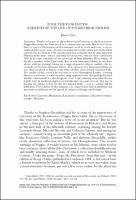Chapter Poge the Florentyn: A Sketch of the Life of Poggio Bracciolini
Abstract
Thanks to his part in the rediscovery of Lucretius in the Renaissance Poggio Bracciolini has been much in academic news recently. But he was always there as a part of the histories of that moment, in all its twists and turns, as an example of what it was to be a Renaissance humanist in the earlier part of the XVth century. He was born in 1380 and educated first in Arezzo. But he soon moved to Florence to become a notary and from his intellectual contacts there a little after 1403 he became a member of the entourage of Pope Benedict IX to remain all his life a member of the Papal court. But, in true humanist fashion, he was busy always with his writings, taking on a range of general subjects, nobility, the vicissitudes of Fortune and many others. Also, again in true humanist fashion, he was often involved in dispute with other scholars, most notably Lorenzo Valla. Yet, amidst all this activity, he had time to travel throughout Europe, scouring libraries to uncover, as with Lucretius, long neglected texts. But perhaps his most notable achievement was the design of a new script, moving away from the less legible texts of medieval copyists to provide one, far easier to read, that was to become the model in Italy for the first printed books – as it is a model still for publishers. Few scholars of that moment can claim to have had so profound and persistent an influence on the spread of culture in Europe and beyond.


 Download
Download Web Shop
Web Shop